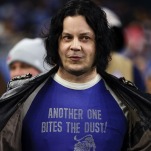After 25 years in TV, Paul Simms wants to see other people’s lives on screen

In his 25 years in the TV business, Paul Simms has created a sitcom classic (NewsRadio), written for a pioneering single-camera comedy (The Larry Sanders Show, following his real-life talk-show stint at David Letterman’s Late Night), and worked on several of the shows that that series opened the door for (Girls, Flight Of The Conchords, Bored To Death). Most recently, Simms served as executive producer for two of the most highly anticipated premieres of the fall: First to debut is Atlanta, created by and starring Donald Glover, which follows the travails of a twentysomething ATL native trying to manage his cousin’s budding rap career. Divorce, meanwhile, comes from Sharon Horgan and stars Sarah Jessica Parker and Thomas Haden Church as a couple in a crumbling marriage. Following the Atlanta panel at this summer’s Television Critics Association press tour, Simms spoke with The A.V. Club about both new shows, Larry Sanders’ legacy, and wanting to see other people’s lives on TV.
The A.V Club: What drew you to Atlanta?
Paul Simms: The script. Someone said, “Do you want to have lunch with Donald Glover,” and I said, “Yeah, he’s funny,” but I thought it was to meet him. He said, “We have this script that we’ve been working on for FX, but we just can’t quite get it over the top.” I said, “All right, let me look at it.” I just loved it. I don’t even know how to describe what I loved about it. It had such a specific point of view, and even though I’m a 50-year-old white guy, I always loved hip-hop, and it just felt like such a—you know, people talk about wanting to see their own life on TV, and I’m like, no, I want to see other people’s lives. I want to go into a different world, and that’s what I really liked about it.
Donald and I worked on [the script] a little bit, and then FX picked it up. It was a fun and unusual working situation for me, because I think they wanted me on as the older person who could help the younger guys, but there were just never any problems. Donald and the cast really knew what they wanted to do, so every time they would send me a script, I’d be like, “Oh, is this going to be the one where I have to go, ‘Oh, guys, you really need to fix this?’” And every one was better than the previous one. So it was great. I’m just along for the ride. It’s true. Other things I’ve worked on, I’ve had to work so hard and do so much writing. With this, it was never more than, “Eh, maybe tighten that scene up a little bit,” and then just sit back and enjoy watching the dailies.
AVC: What was keeping the script from going over the top?
PS: I don’t know. I’ve been doing this for 25 years now, and I still don’t know. Because after Donald and I started working on it together, we didn’t change that much from what he already had. I think that my enthusiasm for it helped a little bit. But once FX was into it, they were really into it. It’s just hard to get people to do anything in life.
AVC: Wanting to see other people’s lives on screen, being the 50-year-old white guy working on the hip-hop show with the all-black cast—what was it like to be in the middle of that?
PS: It was great. Donald had written [the show] very specifically and detailed and very personally, and there were times I would read a script that he or his brother had written, and I’d go like, “I don’t really understand this thing,” and he’d explain it to me, and I’d go like, “All right, good, now I understand it, but don’t explain it for the rest of the audience. Let them figure it out, too.” That’s another one of the things I liked about Donald’s approach—he specifically is not afraid to leave things unexplained and not fill in every blank the way people always think you have to. Like, “Where’s this guy from and what’s that?” He intentionally wants people to watch this, and watch it twice, and maybe speculate about it and talk about it. There was one time he said he wanted to make a show that was like Twin Peaks with rappers. I thought that was a great explanation. Because it’s a show that’s not a laugh a minute, but it has a definite feel. You heard some of the questions at [the press tour panel], they were going like, “Is it surreal? Do chicken wings really glow?” It’s about being authentic to—if I may use the term—a vibe. I should never use that term. That really sounds bad coming out of my mouth. “It’s all about the vibe, man.”






![Rob Reiner's son booked for murder amid homicide investigation [Updated]](https://img.pastemagazine.com/wp-content/avuploads/2025/12/15131025/MixCollage-15-Dec-2025-01-10-PM-9121.jpg)

























![HBO teases new Euphoria, Larry David, and much more in 2026 sizzle reel [Updated]](https://img.pastemagazine.com/wp-content/avuploads/2025/12/12100344/MixCollage-12-Dec-2025-09-56-AM-9137.jpg)







